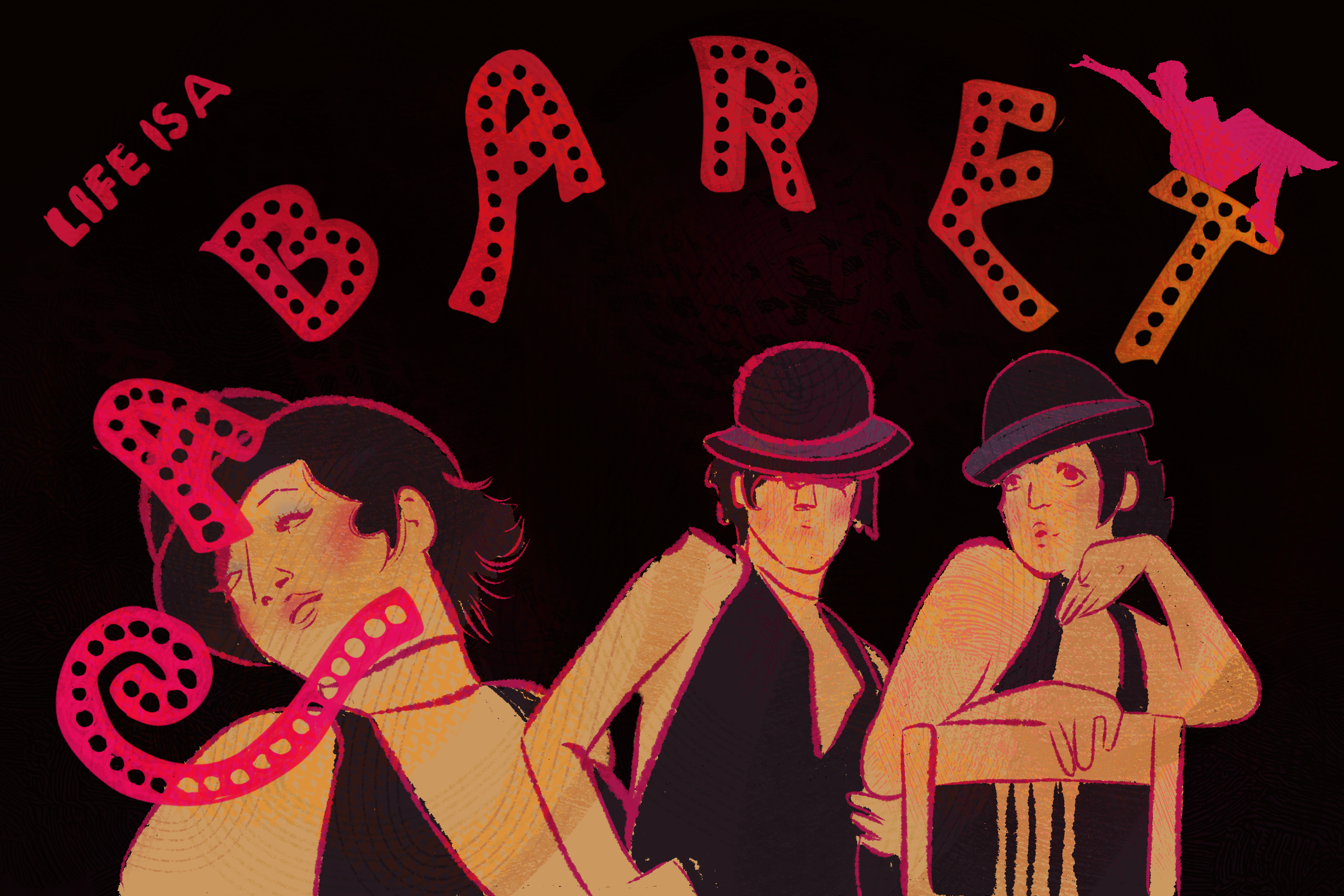CW: Nazism
Through a smoke-filled haze of multicolored lights streaming, the Kit Kat Club comes to life in all its sensuous glory. A brass section blares while a drum roll makes the whole scene come alive. Though the lively numbers are muddled with political commentary making the line between reality and the stage blurred. Taboo topics are set center stage and belted full out in song. Set in 1930s Berlin, Bob Fosses’ 1972 musical film “Cabaret” not only does all this with wonderfully dark satire, but also pairs it with scandalous song and dance.
“Cabaret” follows the story of Kit Kat Club star Sally Bowels portrayed by Liza Minnelli and a repressed bi-sexual professor from Britain, Brian Roberts, played by Michael York. The movie chronicles their sordid romance with the decay of the German Republic and the rise of the Nazi party serving as a backdrop. The surreal time in politics and humanity along with the strange dynamic between the two characters allow for a story that tackles some of the most controversial issues both of that era and parallel to the present day. While the entire musical pays homage to tongue-in-cheek satire and boisterous cynicism, the issues at hand are best seen in the movies wrangling with the political and economic strife at the time. As well as the issues with extremist nationalism and of course, apathy.
The political strife showcased in “Cabaret” is subtle. So subtle that you may not even realize it until the credits roll in at the end of the movie. We first get a glimpse into the problem when a member of the Nazi party is thrown out of the Kit Kat Club. This moment stands as a one-off event that does not hold much relevance to the story. That is until we see the change of sentiment towards the Nazi party, which is primarily seen in the change of the club’s clientele.. We get to see some of the economic strife that led to the fall of the German republic in the song “Money Money.”
The song begins with Sally Bowels and the Emcee, played by Joel Grey singing “Money makes the world go around,” which is a statement that still rings true today. This is especially relevant to the present, as one of the most contributing factors to the rise of the Nazi party came from the economic strife that occurred before its ascent. With a comical polka vibe, the song continues to describe the importance of money and puts an emphasis on how quickly “love flies out the door” when there is none. This song follows a scene where Sally begins to take favor of a wealthy man named Max, played by Helmut Griem is struggling to decide between her love for Brian and the money Max represents. While this may appear as a basic struggle between the heart and the stomach, it can be viewed as a representation of morality versus stability at the national scale. In this case, Brian represents morality and one’s social well-being. While Max represents stability and wealth. On the one hand, there is a clear conscience, and yet on the other, there is a full stomach. It is this maxim that eventually led Germany to its darkest period in history but it was not this issue alone. The use of propaganda and increase in extremist nationalism also aided in this which is also displayed beautifully in “Cabaret.”
Perhaps one of the more disturbing issues that “Cabaret” aims to tackle is the increasing nationalism throughout the movie. The aforementioned political and economic strife led directly to this, but ultimately it was the increasing sentiment towards the nation as the divine that led to the grim ending we are left with today. We can see this increasing nationalism through various ways, whether it be propaganda being handed out by members of the genocidal Nazi party Or the ways that the party falsely promised a better tomorrow in Germany. The song “Tomorrow Belongs to Me” serves as the most chilling example of that agenda.
The scene is set in a Biergarten between Max and Brian having a drink and discussing their plans to move to Africa. Their conversation is interrupted by an innocent boy singing a sweetly melodic song. The camera focuses on his face and viewers can see a picture of Arianism staring softly into the sky. The camera slowly pans down and the truly sinister nature of this song begins to take hold. The shot shows the swastika on his arm marking him as a Hitler Youth all while the song continues. Eventually, the crowd slips into a frenzy, as everyone on set sings along with the boy. The scene becomes more ecstatic with a manic look overcoming everyone’s eyes. Brian and Max take their leave as Brian asks Max “Do you think you can still control them?” Essentially, the song focuses on the idea of a “better tomorrow” for Germany yet that couldn’t be further from the truth.
This scene perfectly encapsulates the power of nationalism and marks a major turning point in the movie where we begin to see the rise of the horrific party go into full swing. It is only after this scene that we begin to see the Anti-Semitism take effect, with side characters Fritz Wendel played by Fritz Wepper and Natalia Landauer’s portrayed by Marissa Berenson love story showcasing this grim reality. These star-crossed lovers face many trials including social exclusion, loss of status, and worst of all the endangerment of their lives. This happens to Natalia simply because she is Jewish. The musical emphasizes this issue by juxtaposing reality with a song in the Kit Kat Club performed by the Emcee.
The song is entitled “If you could see her” and it draws a parallel between Fritz as the Emcee and Natalia as a Monkey. This grotesque display highlights the increasing anti-Semitic view of the Jewish community and goes on to describe a lover trying to get the audience to understand their love for the monkey. The song ends with the line “She wouldn’t look Jewish at all” which devolves into a cacophony of brass that sounds manic and deranged. This emphasizes not only the ridiculousness of the stance but also the use of propaganda to push this narrative. Perhaps the most striking issue that the movie throws metaphorical rocks at is one that is still very relevant today. This is the issue of apathy.
Apathy is the state of indifference to an individual or group. And nowhere is it seen better than in the titular character Sally. Throughout the movie, we see this complex character often ignore the signs of the times and prioritize herself. We first catch a glimpse of her apathy when her budding romance with Brian begins to take shape. As scenes advance, the two stars spend time with one another and the strange romance, that will later leave no one happy, follows suit. These scenes later show an act at the club performed by Sally Bowels herself. The song opens with the Emcee followed by a rolling piano lick leading into the first line.
“Mien Heir” is the song at hand, and it describes the staccato melody of the way Sally goes from man to man and place to place. Her allegiance is only to herself as she sings, “I’ve always said that I was a rover” in a playfully seductive manner. This line is eventually followed by the beautiful line “You’ve every cause to doubt me, mien heir” and the song ends with a phenomenal grandiosity of Ms. Bowels belting “Bye Mien Heir” before the song ends and the scene cuts. Her devil-may-care attitude is demonstrated perfectly in this song but the real-life effect is better seen in her final performance entitled “Cabaret”.
The events leading to her final song involve an ending to both her romance with Brian and Max and an abortion that she writes off as “one of her whims.” Accompanying this fate is her final decision to stay in Germany regardless of the Nazi Party’s rise. She takes notice of the way the world is crumbling around her and instead of moving to safety, she chooses to stay in the temporary haven of the Kit Kat Club. In her grand finale, Sally sings about many things but ultimately it is about her choice to dance through life. “What goods admitting some prophet of doom, to wipe every smile away” sings Sally, and we see her true character begin to show. She doesn’t care about the issues at hand, nor the effect they have on others. She only seems to care for her hedonism. In the song, she describes her friend Elsie’s death who succumbed to her vices while living a life of self-indulgence. She sings “When I go, I’m going like Elsie,” further highlighting her choice to live a life in pursuit of pleasure.
To Sally, life is “Only a cabaret” and she “Loves a cabaret.” She pronounces these final lines with the roaring band coming to a startling halt eerily reminiscent of a final nail in a coffin. Her inability to care for others ultimately leads to her downfall, as she ends up in a Nazi-occupied Germany which presumably led to a terrible life during the war. This is not just her sentiment but stands as a representation for many’s path of least resistance that seemed to be the best and only choice.
“Cabaret” poignantly portrays many ideas in ways that are both comical and disturbing. Its ability to blend reality with the stage and make it all heart-wrenchingly beautiful is truly incredible. The story does not only expose the ills of the time but shows them in a way that makes the issues terribly relatable. Our world is currently filled with economic and political strife and an almost universal experience. Nationalism is a concept we have become far too familiar with as extremists have used this to create horrible events The movie showcases apathy, with a song so old it could be sung in harmony by all the nations. To not care is what left Sally and most of the country in moral and physical ruin and what contributed to one of the worst times in human history. “Cabaret” exposes these issues beautifully and helps us see the ways that those before us have failed and how we can be better. So explore these concepts, take a seat and watch the movie-musical for yourself and “Come to the Cabaret.”
“Cabaret” is currently available for rent on Prime Video and iTunes, along with Vudu and Google Play.

















